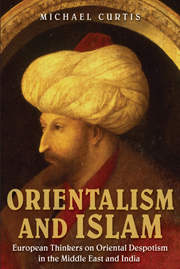Book contents
- Frontmatter
- Contents
- Acknowledgments
- Introduction: What's Past Is Prologue
- 1 European Views of Islam and Their Correlation with Oriental Despotism
- 2 Observant Travelers
- 3 Political Thinkers and the Orient
- 4 The Oriental Despotic Universe of Montesquieu
- 5 Edmund Burke and Despotism in India
- 6 Alexis de Tocqueville and Colonization
- 7 James Mill and John Stuart Mill: Despotism in India
- 8 Karl Marx: The Asiatic Mode of Production and Oriental Despotism
- 9 Max Weber: Patrimonialism as a Political Type
- 10 Conclusion
- Notes
- Select Bibliography
- Index
1 - European Views of Islam and Their Correlation with Oriental Despotism
Published online by Cambridge University Press: 05 June 2012
- Frontmatter
- Contents
- Acknowledgments
- Introduction: What's Past Is Prologue
- 1 European Views of Islam and Their Correlation with Oriental Despotism
- 2 Observant Travelers
- 3 Political Thinkers and the Orient
- 4 The Oriental Despotic Universe of Montesquieu
- 5 Edmund Burke and Despotism in India
- 6 Alexis de Tocqueville and Colonization
- 7 James Mill and John Stuart Mill: Despotism in India
- 8 Karl Marx: The Asiatic Mode of Production and Oriental Despotism
- 9 Max Weber: Patrimonialism as a Political Type
- 10 Conclusion
- Notes
- Select Bibliography
- Index
Summary
As summarized briefly in the introduction, commentary by Europeans on the nature of Eastern social and political systems was commingled with their conception of the Islamic religion, though their knowledge of it was imperfect. Criticism by Christians of its rival religion was voiced soon after the advent of Islam starting with St. John of Damascus in the late seventh century, who wrote of “the false prophet,” Muhammad. Rivalry, and often enmity, continued between the European Christian world and the Islamic world, whether the latter can be regarded as consisting of Islamic societies or societies only partly molded by Islam. For Christian theologians, the “Other” was the infidel, the Muslim. Despite changing Christian images of Islam it was generally regarded as theologically false and as the basis of a hostile, different, and dangerous civilization. Theological disputes in Baghdad and Damascus, in the eighth to tenth centuries, and in Andalusia up to the fourteenth century led Christian Orthodox and Byzantine theologians and rulers to continue seeing Islam as a threat.
In the twelfth century, Peter the Venerable, the Abbot of Cluny, who had the Koran translated into Latin, regarded Islam as a Christian heresy and Muhammad as sexually self-indulgent and a murderer, and as a person who was not the Lord but a messenger. However, he called for the conversion, not the extermination, of Muslims.
- Type
- Chapter
- Information
- Orientalism and IslamEuropean Thinkers on Oriental Despotism in the Middle East and India, pp. 31 - 37Publisher: Cambridge University PressPrint publication year: 2009

